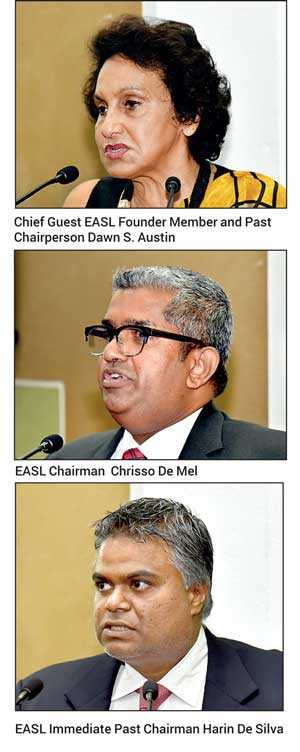Tuesday Feb 17, 2026
Tuesday Feb 17, 2026
Tuesday, 30 July 2019 00:35 - - {{hitsCtrl.values.hits}}

Exporters are still struggling with a range of issues including inconsistent policymaking, high power prices, political instability and skilled labour shortages, top industry representatives said yesterday. 
Exporters Association of Sri Lanka (EASL) Founder Member Dawn Austin presenting the keynote address at the 22nd Annual General Meeting (AGM) at the Ceylon Chamber of Commerce yesterday said that many issues that have existed for a number of years still continue to pose challenges to exporters.
Austin pointed out that in order to remain competitive Sri Lanka’s exporters would have to invest more in automation but was prohibited from doing so, partly due to high electricity prices that were earlier highlighted to government policymakers for solutions.
However she pointed out that even six years later there has been no reduction of energy costs and exporters are still affected by unannounced or unscheduled power cuts. She also questioned why the Government had not at least encouraged renewable energy solutions in the country.
Austin also pointed out that even though the Government had worked to negotiate new trade agreements non-tariff barriers in existing free trade deals, especially with India, had not been tackled effectively. She pointed out that while food exports to India undergo numerous tests, similar Indian products can enter Sri Lanka with relative ease.
Austin also called on the Government to evolve a proper labour migrant policy so exporters could employ people from other countries in South Asia. She also advocated a clearly defined Public-Private Partnership (PPP) strategy with clearly enunciated regulations and legal framework to encourage foreign investors.
“Reducing the overlapping of line ministries related to for example, agriculture, exports and investment to a more simplified process will definitely create a more conducive and transport environment for more PPPs and inflow of much valued FDIs,” she said.
EASL Chairman Chrisso de Mel presenting his views called for greater engagement from the Government, more consistent policies and increased transparency. He also appealed to the Government to implement two policy documents that were earlier presented by the EASL to increase exports.
“Though some of our proposals have been well received and even incorporated into the national Budget we are disappointed that the proper implementation has not been done and consequently not helped us move forward. We have not seen the intent and the commitment on the part of Government to fire all guns to increase exports with the exception of International Trade and Development Strategies Ministry, Ports and Shipping Ministry and since of late the Science and Technology Ministry.” The Export Development Board was praised by de Mel for formulating the National Export Strategy and engaging extensively with the exporters as well as the Commerce Department. The efforts of Customs and Board of Investment was also mentioned.
“I urge all institutions that facilitate exports to fully understand Sri Lanka’s obligations to the Trade Facilitation Agreement of the World Trade Organisation (WTO) and stay committed to execute all trade facilitation policies to improve Ease of Doing Business and move towards a national single window on which we have all invested much time. I must insist trade cannot see sudden changes in regulation without proper dialogue and consultation as done on many occasions in the recent past,” he said.
Pix by Ruwan Walpola